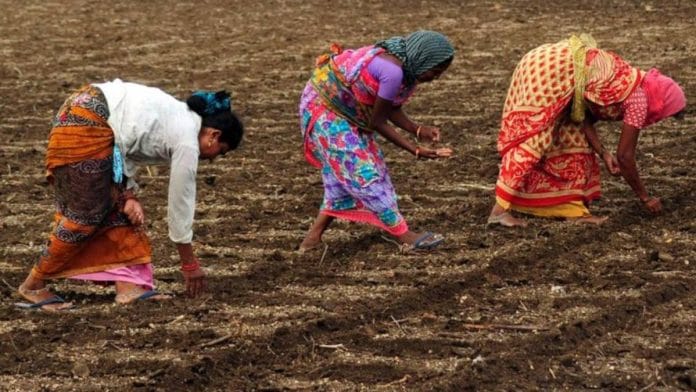New Delhi: It’s a common refrain in traditional societies that a woman’s place is at home and her primary responsibility is that of taking care of her family. This is more so post-childbirth when mothers are expected to be the primary caregiver for the child. Most extant research show that childbirth has negative impact on a woman’s employment prospects. However, latest evidence from India defies this generalisation.
A study published by the United Nations University World Institute for Development Economics Research (UNU-WIDER) found that for rural women engaged in agricultural work, the birth of a child poses no significant threat to their employment prospects.
The study, by Rosa Abraham of the Azim Premji University (India), Rahul Lahoti of the ETH Zurich (Switzerland) and Hema Swaminathan from the IIM Bengaluru, interviewed about 6,000 people from two states in India — Rajasthan and Karnataka. (The study does not mention why these two states were chosen.)
According to the researchers, after the birth of the first child, the overall probability of the mothers getting employment didn’t see any significant change. While most of the women stop working in the year of childbirth, the study observed that her likelihood of getting paid work gradually increases.
“Our results are largely driven by rural women, for whom agriculture or some form of informal work is likely to dominate their employment. These types of work may be more conducive to being undertaken along with childcare responsibilities than work in an urban or more formalised setting,” the study observed.
Childbirth and its impact on a mother’s employment have been studied in detail in developed countries, where women are engaged in formal employment and have access to childcare. The authors, through this study, show evidence that the negative effects of motherhood on a woman’s employment, experienced by other countries, cannot be generalised for India.
However, since the study doesn’t factor in the intensity of work (number of hours engaged in work), change in earnings etc., there are many aspects related to the impact of childbirth on a woman’s employability that is not covered here.
The authors also observed that “the birth of a child, while posing no threat to employment prospects, significantly increases the likelihood of women being in informal employment. In fact, we find that this increase is among less-educated women, and women from poorer households.”
The authors added: “This indicates, for many new mothers, withdrawing from employment is not an option. They are forced to participate in work, which is informal, soon after childbirth. This immediate return to work is likely to come at the cost of the health of the mother and child. The authors argue that the lack of ‘penalty’ as understood in the developed country context may not be an indicator of a favourable outcome for mothers. Rather, the penalty comes in the form of having to continue work immediately after childbirth in informal, precarious and low paid work.”
Also read: How ‘pad bank’ set up by Allahabad University students is helping slum residents junk rags
Childbirth & employment prospects
Using the Life History Calendar (LHC) method — which uses ‘autobiographical information’ about the life events of the respondents — on 3,078 of the 6,000 people included in the study, the researchers recorded chronological series of events respondents went through since they turned 15.
The LHC Interviews were conducted in 2,065 households. Of the respondents, 1,766 were women and 1,312 men. About 80 per cent of the respondents were from rural areas.
According to the study, 49.9 per cent of the women who were already in the labour force stayed on, while only 6.5 per cent of women left the labour market at all once they entered the force. However, the authors also noted that about 40 per cent of the respondents never got a chance to enter the labour market at all.
The study also found that most of the respondents had little choice when it came to the nature of employment.
According to the authors of the study, the economic growth in India, which happened mostly due to the service sector, has brought little diversification of employment opportunities for women, especially in rural India. They cite the fact that over 73 per cent women in rural households continue to be engaged in informal agricultural (and related) work, to support this.
Also read: Don’t just count women ministers in Modi govt. Portfolios more crucial for equality
Little to choose from
In rural areas, the societies’ gender norms have restricted the work that women are allowed to do. Most women are engaged in work that they can do from home, or where they do not have to travel far and are, therefore, also able to contribute to housework. This makes it possible for them to continue working.
The other reason is that in rural societies, extended families continue to live together, so there is someone at home to take care of the child in the absence of the mother. The major reason for women not facing any employment loss after childbirth was the conducive work environment for women in rural areas, noted the researchers.
Unlike in Western countries, institutional childcare (publicly funded creche where working mothers could drop their children) is almost nonexistent in rural India and the children were mostly taken care of by their families, found the researchers. Women who had more children (the elder children look after the younger, in this case) or lived with spouses and in-laws were more likely to have a paid job, compared to those living with parents or other family members.
(This story has been updated to reflect additions the authors of the UN study have made in their report.)
(Edited by Poulomi Banerjee)
Also read: Pew India survey takes us back to one more thing Gandhi, Savarkar differed on






